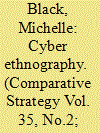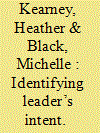| Srl | Item |
| 1 |
ID:
150090


|
|
|
|
|
| Summary/Abstract |
There seems to be a current push for intelligence to be more informed through sociocultural analysis. This article argues that a new variation of ethnography, cyber ethnography, is the answer to calls for additional support, and should be incorporated into the Department of Defense (DoD) methodological “tool box.” This article answers: What is cyber ethnography and how could it contribute to United States defense work? What are some of the method's limitations and challenges, especially when performed by DoD personnel? At the same time, what type of community could be studied by the DoD using cyber ethnography? And finally, what are the requirements to perform this method?
|
|
|
|
|
|
|
|
|
|
|
|
|
|
|
|
| 2 |
ID:
177040


|
|
|
|
|
| Summary/Abstract |
One of the most challenging tasks for a deterrence planner is assessing a leader's intent, which requires having an in-depth level of subject-matter expertise. This article investigates this challenge and offers answers to the following question “how can we identify a leader’s intent” to aid deterrence planners, operators, and policymakers? To examine this question, we used a multi-method approach by performing several qualitative analyses on Kim Jong-Un’s New Year’s Eve speeches (2013–2018). We focused on techniques that assessed the underlying facets of intent (e.g. cognitive beliefs and goals). These speeches served as a viable secondary source that identified objective markers to which we applied a coding scheme to extract the adversary’s “intent” to perform a particular action. This article argues that identifying intent can help policy-makers and planners understand if an adversary has plans to perform specific operations.
|
|
|
|
|
|
|
|
|
|
|
|
|
|
|
|
| 3 |
ID:
192606


|
|
|
|
|
| Summary/Abstract |
“Multi-domain operations” is an emerging concept that many defence organisations are trying to define and to decide how and when to use as part of their operations and warfighting strategies. This article addresses these questions and specifically identifies how the emerging concept of multi-domain operations, along with escalation management, can fit into the future of the North Atlantic Treaty Organization’s (NATO) warfighting needs. This article examines and debates concepts related to multi-domain operations and deterrence and addresses the importance of maintaining this strategic repertoire within the current geopolitical environment. It uses a European case study to illustrate the uses and impact of multi-domain escalation management. Finally, it provides a holistic view of research innovation in this area and its impact on NATO’s potential usage of multi-domain.
|
|
|
|
|
|
|
|
|
|
|
|
|
|
|
|